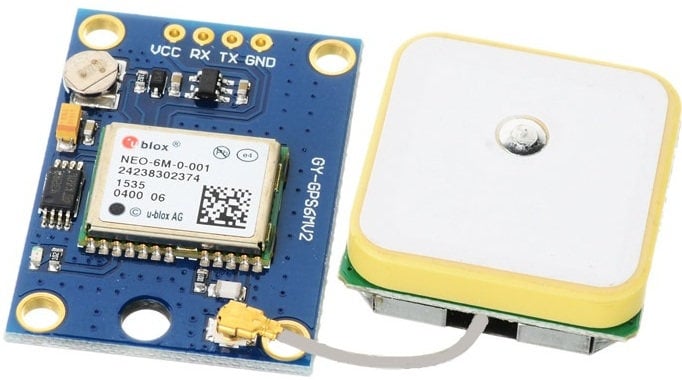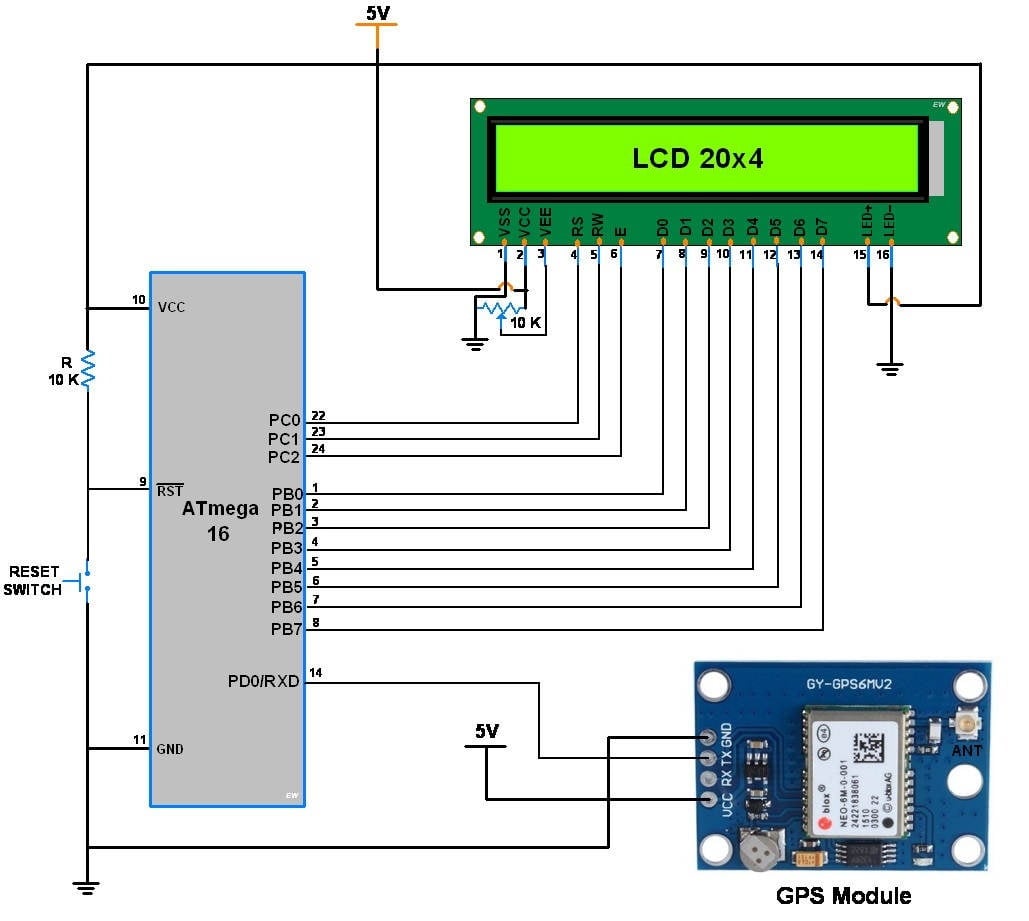Overview of GPS
Global Positioning System (GPS) makes use of signals sent by satellites in space and ground stations on Earth to accurately determine their position on Earth.
Radio Frequency signals sent from satellites and ground stations are received by the GPS. GPS makes use of these signals to determine its exact position.
The GPS itself does not need to transmit any information.
The signals received from the satellites and ground stations contain timestamps of the time when the signals were transmitted. By calculating the time difference between the time the signal was transmitted and the time the signal was received, and using the speed of the signal, the distance between the satellites and the GPS can be determined using a simple formula for distance using speed and time.
Using information from 3 or more satellites, the exact position of the GPS can be triangulated.
For more information about GPS and how to use it, refer to the topic GPS Receiver Module in the sensors and modules section.
The GPS receiver module uses USART communication to communicate with the controller or PC terminal.
For information about USART in AVR ATmega16/ATmega32 and how to use it, refer the topic USART in AVR ATmega16/ATmega32 in the ATmega inside section.

Connection Diagram of GPS Receiver with ATmega16/32

Get GPS Location using ATmega16/32
Now let’s interface the GPS receiver module with AVR ATmega16/ATmega32 and display the Time, Latitude, and Longitude on an LCD20x4 display.
In this interfacing, AVR based ATmega microcontroller will read data serially from GPS receiver using USART communication with a 9600 Baud rate.
Then parse the “$GPGGA” string to extract information regarding time, latitude, and longitude.
The Latitude and Longitude displayed on LCD20x4 are in Degree Decimal format.
GPS Receiver Code for ATmega16/32
/*
GPS Information extraction using ATmega16/32
http://www.electronicwings.com
*/
#define F_CPU 8000000UL
#define SREG _SFR_IO8(0x3f)
#include <avr/io.h>
#include <string.h>
#include <stdio.h>
#include <stdlib.h>
#include <stdbool.h>
#include <util/delay.h>
#include <avr/interrupt.h>
#include "LCD_20x4_H_file.h"
#include "USART_Interrupt.h"
void convert_time_to_UTC();
void convert_to_degrees(char *);
#define Buffer_Size 150
#define degrees_buffer_size 20
char Latitude_Buffer[15],Longitude_Buffer[15],Time_Buffer[15],Altitude_Buffer[8];
char degrees_buffer[degrees_buffer_size]; /* save latitude or longitude in degree */
char GGA_Buffer[Buffer_Size]; /* save GGA string */
uint8_t GGA_Pointers[20]; /* to store instances of ',' */
char GGA_CODE[3];
volatile uint16_t GGA_Index, CommaCounter;
bool IsItGGAString = false,
flag1 = false,
flag2 = false;
void get_gpstime(){
cli();
uint8_t time_index=0;
/* parse Time in GGA string stored in buffer */
for(uint8_t index = 0;GGA_Buffer[index]!=','; index++){
Time_Buffer[time_index] = GGA_Buffer[index];
time_index++;
}
convert_time_to_UTC();
sei();
}
void get_latitude(uint16_t lat_pointer){
cli();
uint8_t lat_index;
uint8_t index = lat_pointer+1;
lat_index=0;
/* parse Latitude in GGA string stored in buffer */
for(;GGA_Buffer[index]!=',';index++){
Latitude_Buffer[lat_index]= GGA_Buffer[index];
lat_index++;
}
Latitude_Buffer[lat_index++] = GGA_Buffer[index++];
Latitude_Buffer[lat_index] = GGA_Buffer[index]; /* get direction */
convert_to_degrees(Latitude_Buffer);
sei();
}
void get_longitude(uint16_t long_pointer){
cli();
uint8_t long_index;
uint8_t index = long_pointer+1;
long_index=0;
/* parse Longitude in GGA string stored in buffer */
for( ; GGA_Buffer[index]!=','; index++){
Longitude_Buffer[long_index]= GGA_Buffer[index];
long_index++;
}
Longitude_Buffer[long_index++] = GGA_Buffer[index++];
Longitude_Buffer[long_index] = GGA_Buffer[index]; /* get direction */
convert_to_degrees(Longitude_Buffer);
sei();
}
void get_altitude(uint16_t alt_pointer){
cli();
uint8_t alt_index;
uint8_t index = alt_pointer+1;
alt_index=0;
/* parse Altitude in GGA string stored in buffer */
for( ; GGA_Buffer[index]!=','; index++){
Altitude_Buffer[alt_index]= GGA_Buffer[index];
alt_index++;
}
Altitude_Buffer[alt_index] = GGA_Buffer[index+1];
sei();
}
void convert_time_to_UTC()
{
unsigned int hour, min, sec;
uint32_t Time_value;
Time_value = atol(Time_Buffer); /* convert string to integer */
hour = (Time_value / 10000); /* extract hour from integer */
min = (Time_value % 10000) / 100; /* extract minute from integer */
sec = (Time_value % 10000) % 100; /* extract second from integer*/
sprintf(Time_Buffer, "%d:%d:%d", hour,min,sec);
}
void convert_to_degrees(char *raw){
double value;
float decimal_value,temp;
int32_t degrees;
float position;
value = atof(raw); /* convert string into float for conversion */
/* convert raw latitude/longitude into degree format */
decimal_value = (value/100);
degrees = (int)(decimal_value);
temp = (decimal_value - (int)decimal_value)/0.6;
position = (float)degrees + temp;
dtostrf(position, 6, 4, degrees_buffer); /* convert float value into string */
}
int main() {
GGA_Index=0;
memset(GGA_Buffer, 0, Buffer_Size);
memset(degrees_buffer,0,degrees_buffer_size);
LCD_Init(); /* initialize LCD16x2 */
_delay_ms(3000); /* wait for GPS receiver to initialize */
USART_Init(9600); /* initialize USART with 9600 baud rate */
sei();
LCD_Clear();
while (1)
{
_delay_ms(1000);
LCD_String_xy(1,0,"UTC Time: ");
get_gpstime(); /* Extract Time in UTC */
LCD_String(Time_Buffer);
LCD_String(" ");
LCD_String_xy(2,0,"Lat: ");
get_latitude(GGA_Pointers[0]); /* Extract Latitude */
LCD_String(degrees_buffer); /* display latitude in degree */
memset(degrees_buffer,0,degrees_buffer_size);
LCD_String_xy(3,0,"Long: ");
get_longitude(GGA_Pointers[2]); /* Extract Longitude */
LCD_String(degrees_buffer); /* display longitude in degree */
memset(degrees_buffer,0,degrees_buffer_size);
LCD_String_xy(4,0,"Alt: ");
get_altitude(GGA_Pointers[7]); /* Extract Altitude in meters*/
LCD_String(Altitude_Buffer);
}
}
ISR (USART_RXC_vect)
{
uint8_t oldsrg = SREG;
cli();
char received_char = UDR;
if(received_char =='$'){ /* check for '$' */
GGA_Index = 0;
CommaCounter = 0;
IsItGGAString = false;
}
else if(IsItGGAString == true){ /* if true save GGA info. into buffer */
if(received_char == ',' ) GGA_Pointers[CommaCounter++] = GGA_Index; /* store instances of ',' in buffer */
GGA_Buffer[GGA_Index++] = received_char;
}
else if(GGA_CODE[0] == 'G' && GGA_CODE[1] == 'G' && GGA_CODE[2] == 'A'){ /* check for GGA string */
IsItGGAString = true;
GGA_CODE[0] = 0; GGA_CODE[1] = 0; GGA_CODE[2] = 0;
}
else{
GGA_CODE[0] = GGA_CODE[1]; GGA_CODE[1] = GGA_CODE[2]; GGA_CODE[2] = received_char;
}
SREG = oldsrg;
}
Video of GPS Location using Atmega16/32
Components Used |
||
|---|---|---|
| ATmega 16 ATmega 16 |
X 1 | |
| Atmega32 Atmega32 |
X 1 | |
| Ublox NEO-6m GPS Ublox Neo 6m GPS |
X 1 | |
| LCD16x2 Display LCD16x2 Display |
X 1 | |
